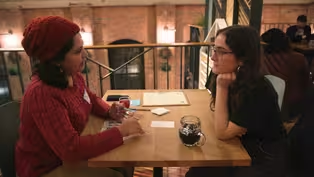
Weekly Insight
Clip: Season 6 Episode 7 | 4m 52sVideo has Closed Captions
The craft-brewing business should be booming, but state lawmakers are holding it back.
The craft-brewing business is a fan favorite among local residents and tourists alike. Its popularity has brewers wanting to expand their operations. But state lawmakers don’t agree. Ian Donnis reports on how and why they are being restricted.
Problems playing video? | Closed Captioning Feedback
Problems playing video? | Closed Captioning Feedback
Rhode Island PBS Weekly is a local public television program presented by Ocean State Media

Weekly Insight
Clip: Season 6 Episode 7 | 4m 52sVideo has Closed Captions
The craft-brewing business is a fan favorite among local residents and tourists alike. Its popularity has brewers wanting to expand their operations. But state lawmakers don’t agree. Ian Donnis reports on how and why they are being restricted.
Problems playing video? | Closed Captioning Feedback
How to Watch Rhode Island PBS Weekly
Rhode Island PBS Weekly is available to stream on pbs.org and the free PBS App, available on iPhone, Apple TV, Android TV, Android smartphones, Amazon Fire TV, Amazon Fire Tablet, Roku, Samsung Smart TV, and Vizio.
Providing Support for PBS.org
Learn Moreabout PBS online sponsorship- Ted, welcome back.
It's good to see you.
President Trump has been back in the Oval Office for less than a month, and already there has been so much activity happening from his administration that at times it's hard for reporters to keep up.
- It really is, Michelle.
I looked before we started taping this, and the White House has already issued over 60 different executive orders as we're talking today, on everything from birthright, citizenship and abortion, all the way to plastic straws.
So it really has been like a tidal wave of news so far.
- I wanna focus on two policies that could affect Rhode Islanders, specifically your monitoring the federal funding freeze, as well as immigration.
What are you hearing?
- Well, the funding freeze is interesting because there's been so much back and forth.
At first you saw that outcry because people thought it was going to be a huge funding freeze across everything, including Medicaid.
Then it was significantly rolled back, but not fully.
So now, first of all, there's court activity around what is and isn't allowed.
But secondarily, we're still getting these reports, episodically popping up, state government saying this, you know, an energy program is cut off here.
Farm program is cut off there.
So watching to figure out what's really going on with that.
And then on immigration, again, it's not clear what is going to happen.
I mean, the president's talked about mass deportations.
There's a lot of, I think, tension as people watch to see what's going to happen.
But we have not actually seen major large scale raids locally so far either.
So I think people just don't know what to expect right now.
- Providence Mayor, Brett Smiley, spoke about that during a recent meeting in Providence with other New England mayors.
Let's take a listen to some of what he had to say.
- I know it's true for the other Rhode Island mayors with whom I've spoken, and I imagine it's true for the other mayors around the region.
At this moment in time, we are expending a tremendous amount of energy chasing down rumors every time there's a black SUV in the city that somebody doesn't recognize, there's a rumor that it's an ICE raid.
That has not happened in the city of Providence in the last two weeks as far as we know.
- And Ted, of course, we'll continue monitoring that.
In the meantime, there are also major implications from what's happening in Washington DC as it relates to Rhode Island's healthcare sector.
- Yes, and there's two kind of pieces to this I think people should be watching closely.
First is on the National Institutes of Health, the NIH, that it sounds arcane, but they want to change the percentage that universities and other research institutions get for indirect costs.
Basically, the way people should think about this is, when you hear that, you know, Brown has gotten a big grant for cancer research, for example, they can keep a percentage of that that goes toward overhead, lab space, administrators, the overall administration of the university.
And it's sort of a subsidy that helps the university operate.
The Trump administration wants to lower that to 15%.
At Brown, it's closer to something like 30% according to if you calculate based on what they've been saying.
And Brown's saying if that goes through, they might have to abruptly halt clinical trials.
We're talking about things like, as I said, cancer, Alzheimer's research is another, NIH-funded thing there.
So that could have a big effect, though again, that's in the courts now.
And then the other one is on Medicaid.
The House Republicans, as they're putting together their budget, are looking at potentially significant reductions in the Medicaid insurance program.
In Rhode Island, that's well over $2 billion a year comes in from the Feds on Medicaid.
So that's two streams of funding, they're kind of important linchpins of healthcare and medical research in Rhode Island that could be changing significantly, that I think could have a lot of effect.
- Let's go back to the federal funding freeze.
A lot of the legal activity that we're seeing happening is occurring right here in Rhode Island at Federal District Court in front of Chief Judge McConnell, despite it being a national issue.
So how is Rhode Island involved?
- Well, I think Attorney General Peter Neronha, and the other state attorneys general, wanted to file in a court they thought they'd get a hearing, some would say a sympathetic hearing.
Others would just say, you know, a judge they trusted would be, you know, fair minded in this.
And I think they felt good about their odds before Judge McConnell.
And of course, so far it's worked out for them because they got the temporary restraining order against the Trump administration on this.
- And McConnell is used to being in the spotlight to some extent.
Explained for folks who don't know who he is.
- Right, probably not to this degree, Michelle, where Elon Musk is calling for his impeachment on social media, from the federal bench.
But I'm sure we have viewers who recognize Jack McConnell is how he's universally known in Rhode Island, but Judge McConnell, of course, to the lawyers at the bar.
He made millions of dollars as a trial attorney when he was in private practice doing asbestos cases, tobacco cases, things like that, became very prominent.
He used that wealth to become a significant philanthropist, but also to donate a lot to Democratic party, politicians and campaigns.
That became a major source of controversy when President Obama nominated Jack McConnell to the bench back in 2010, because Republicans said he's too embedded, embedded in democratic politics to be a fair minded judge.
In fact, the US Chamber of Commerce, it was the first time they'd ever fought a district court nomination, was Judge McConnell.
Now, Sheldon, White House, Jack Reed beat that back, in the Senate, they got him through.
But you know, unlike a lot of judges at this level, Jack McConnell has felt some of the national heat.
But again, I don't think to the degree he is right now.
- Yeah, and this is different.
- Yeah, exactly.
- Good to see you.
Thank you, Ted.
- Good to be here.
Video has Closed Captions
Clip: S6 Ep7 | 10m 18s | The craft-brewing business should be booming, but state lawmakers are holding it back. (10m 18s)
Providing Support for PBS.org
Learn Moreabout PBS online sponsorship
- News and Public Affairs

Top journalists deliver compelling original analysis of the hour's headlines.

- News and Public Affairs

FRONTLINE is investigative journalism that questions, explains and changes our world.












Support for PBS provided by:
Rhode Island PBS Weekly is a local public television program presented by Ocean State Media

